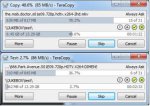Just as an example of ZFS's caching:
Someone in the forum was complaining because they set their hard drives to go to sleep after 30 mins. They use their server to stream movies and they were watching movies and part way through the movie it would freeze 30 seconds or so because the file had been cached up to this point and the drives went to sleep due to inactivity.
I can't remember the command, but if you watch the read rates from your zpool if you start reading a very large file you'll see 200MB/sec+ for the first few seconds you read the file. That's ZFS reading ahead on the file.
Edit: Sorry about sounding aggressive on my previous posts. Your complaint about slow network performance is EXACTLY what us senior members complain about all the time. People didn't read or ignored the manual, the FAQ, and my guide. Then come posting in the forum about their low performance. Well gee, if we say in as many places as we can that you need something for maximum performance and you ignore it what else should we do? Tell you AGAIN? If you haven't listened the other 3 times why would we bother spending time to tell you a 4th time? Yes, some people STILL insist that Realtek are great cards etc. One of the forum admins posted a link to a Realtek quad-port NIC and said "Why.. WHY would someone do this to themselves?"
Honestly, if I had known you were complaining about network performance in post #1 I might never have responded because you should have known better. You only got additional responses from me because I was already discussing it with you and I didn't feel like giving you a "RTFM" answer and leaving you hanging high and dry.
Someone in the forum was complaining because they set their hard drives to go to sleep after 30 mins. They use their server to stream movies and they were watching movies and part way through the movie it would freeze 30 seconds or so because the file had been cached up to this point and the drives went to sleep due to inactivity.
I can't remember the command, but if you watch the read rates from your zpool if you start reading a very large file you'll see 200MB/sec+ for the first few seconds you read the file. That's ZFS reading ahead on the file.
Edit: Sorry about sounding aggressive on my previous posts. Your complaint about slow network performance is EXACTLY what us senior members complain about all the time. People didn't read or ignored the manual, the FAQ, and my guide. Then come posting in the forum about their low performance. Well gee, if we say in as many places as we can that you need something for maximum performance and you ignore it what else should we do? Tell you AGAIN? If you haven't listened the other 3 times why would we bother spending time to tell you a 4th time? Yes, some people STILL insist that Realtek are great cards etc. One of the forum admins posted a link to a Realtek quad-port NIC and said "Why.. WHY would someone do this to themselves?"
Honestly, if I had known you were complaining about network performance in post #1 I might never have responded because you should have known better. You only got additional responses from me because I was already discussing it with you and I didn't feel like giving you a "RTFM" answer and leaving you hanging high and dry.


